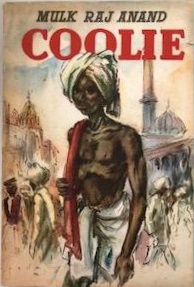
Rasipuram Krishnaswami Iyer Narayanaswami, better known as R. K. Narayan, was an Indian writer and novelist known for his work set in the fictional South Indian town of Malgudi. He was a leading author of early Indian literature in English along with Mulk Raj Anand and Raja Rao.

Dev Anand was an Indian actor, writer, director and producer known for his work in Hindi cinema. Anand is considered as one of the greatest and most successful actors in the history of Indian cinema. Through a career that spanned over six decades, he worked in more than 100 films. Anand is a recipient of four Filmfare Awards, including two for Best Actor. The Government of India honoured him with Padma Bhushan, Indian third highest civilian honour in 2001 and with Dadasaheb Phalke Award in 2002.

Mulk Raj Anand was an Indian writer in English, recognised for his depiction of the lives of the poorer class in the traditional Indian society. One of the pioneers of Indo-Anglian fiction, he, together with R. K. Narayan, Ahmad Ali and Raja Rao, was one of the first India-based writers in English to gain an International readership. Anand is admired for his novels and short stories, which have acquired the status of classics of modern Indian English literature; they are noted for their perceptive insight into the lives of the oppressed and for their analysis of impoverishment, exploitation and misfortune. He became known for his protest novel Untouchable (1935), which was followed by other works on the Indian poor such as Coolie (1936) and Two Leaves and a Bud (1937). He is also noted for being among the first writers to incorporate Punjabi and Hindustani idioms into English, and was a recipient of the civilian honour of the Padma Bhushan.

Manmohan Singh is an Indian retired politician, economist, academician and bureaucrat who served as the Prime Minister of India from 2004 to 2014. He is the fourth longest-serving prime minister after Jawaharlal Nehru, Indira Gandhi and Narendra Modi. A member of the Indian National Congress, Singh was the first Sikh prime minister of India. He was also the first prime minister since Jawaharlal Nehru to be re-elected after completing a full five-year term.

Rishi Raj Kapoor was an Indian actor, film director, and producer who worked in Hindi films. Kapoor was the recipient of several accolades, including a National Film Award and four Filmfare Awards, in a career that spanned 50 years.
Indian English literature (IEL), also referred to as Indian Writing in English (IWE), is the body of work by writers in India who write in the English language but whose native or co-native language could be one of the numerous languages of India. Its early history began with the works of Henry Louis Vivian Derozio and Michael Madhusudan Dutt followed by Rabindranath Tagore and Sri Aurobindo. R. K. Narayan, Mulk Raj Anand and Raja Rao contributed to the growth and popularity of Indian English fiction in the 1930s. It is also associated, in some cases, with the works of members of the Indian diaspora who subsequently compose works in English.

David Dhawan is an Indian director of Hindi films. A member of the Dhawan family, he has directed over 42 films. The 1993 action thriller Aankhen and 1999 comedy Biwi No.1 earned him nominations for the Filmfare Award for Best Director. His notable works include Swarg (1990), Shola Aur Shabnam, Bol Radha Bol, Raja Babu (1994), Coolie No.1 (1995), Saajan Chale Sasural (1996), Judwaa, Hero No. 1, Deewana Mastana, Bade Miyan Chote Miyan (1998), Haseena Maan Jaayegi (1999), Dulhan Hum Le Jayenge (2000), Jodi No.1 (2001), Ek Aur Ek Gyarah (2003), Mujhse Shaadi Karogi (2004), Partner (2007), Chashme Baddoor (2013), Main Tera Hero (2014), Judwaa 2 (2017), and Coolie No. 1 (2020).
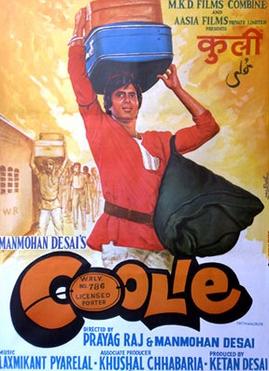
Coolie is a 1983 Indian action comedy film, directed by Manmohan Desai and written by Kader Khan. The film stars Amitabh Bachchan as Iqbal Aslam Khan, a railway coolie, who was separated from his mother Salma due to Zafar's obsession with her. This obsession causes the destruction of her family and her mental breakdown. Years later, fate unites her sons, Iqbal and Sunny and they set out to save Salma from Zafar's captivity. It also starred Rati Agnihotri, Shoma Anand, Suresh Oberoi and Puneet Issar.

Attia Hosain was a British-Indian novelist, author, writer, broadcaster, journalist and actor. She was a woman of letters and a diasporic writer. She wrote in English although her mother tongue was Urdu. She wrote the semi-autobiographical Sunlight on a Broken Column and a collection of short stories named Phoenix Fled. Her career began in England in semi-exile making a contribution to post-colonial literature. Anita Desai, Vikram Seth, Aamer Hussein and Kamila Shamsie have acknowledged her influence.
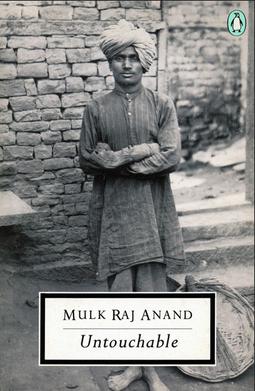
Untouchable is a novel by Mulk Raj Anand published in 1935. The novel established Anand as one of India's leading English authors. The book was inspired by his aunt's experience of being ostracized for sharing a meal with a Muslim woman. The plot of this book, Anand's first, revolves around the argument for eradicating the caste system. It depicts a day in the life of Bakha, a young "sweeper", who is "untouchable" due to his work of cleaning latrines.
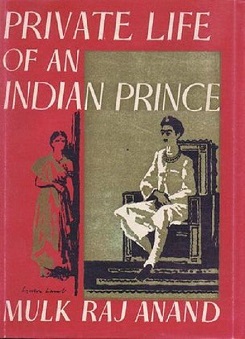
The Private Life of an Indian Prince is a novel by Mulk Raj Anand first published in 1953. The book is classified as one of Anand's most impressive and important works. In keeping with his other writings dealing with the topic of social and political reform, this book deals with the abolition of the princely states system in India. While the novel is not an autobiography, like many of his earlier novels, it follows an autobiographical tone.

The Village is a novel by Mulk Raj Anand first published in 1939. This book was the first of a trilogy that included Across the Black Waters and The Sword and the Sickle. The plot centers on India's political structure, specifically the British rule and the independence movement. The novel revolves around Lal Singh a peasant in the Punjab, his antics going against social norms while in the village, his subsequent enrollment in the army and his troubles in the army, culminating in his return to the village.

Two Leaves and a Bud is a novel by Mulk Raj Anand first published in 1937. Like his other novels, this one also deals with the topic of oppression of the poor, and is about a peasant who tries to protect his daughter from a British soldier. The story is based in the tea plantations of Assam. The book was subsequently adapted to a Hindi film, Rahi, by Dev Anand and simultaneously released in English as The Wayfarer. The book depicts in detail the concept of haves and have-nots and the exploitation of one at the hand of the other, in pre-independence India.
The Sword and the Sickle is a novel by Mulk Raj Anand first published in 1942. Like his other novels, this one also deals with the topic of social and political structures, specifically, the rise of Communism. The title for the book was given to Anand by George Orwell. The novel was in keeping with British and American writings of the time. The book was the final part of the trilogy that included The Village and Across the Black Waters.

Marg (Pathway) is a quarterly Indian art magazine and a publisher of books on the arts, based in Mumbai. It began in 1946, with writer Mulk Raj Anand as its founding editor. It was initially intended to be an encyclopaedia of the arts and culture of India and South Asia.

Across the Black Waters is an English novel by the Indian writer Mulk Raj Anand first published in 1939. It describes the experience of Lalu, a sepoy in the Indian Army fighting on behalf of Britain against the Germans in France during World War I. He is portrayed by the author as an innocent peasant whose poor family was evicted from their land and who only vaguely understands what the war is about. The book has been described as Anand's best work since the Untouchable.
In Lalu's tragedy lied the tragedy of the Indian village and Anand dramatizes a poignant truth: to disposses any one of land is to deny him an identity.—Basavaraj Naikar
Saros Dara Cowasjee was an Indian-born Canadian novelist, short story writer, commentator, critic, anthologist, and screenwriter, as well as a professor emeritus at University of Regina.

The Insider is a roman à clef by P. V. Narasimha Rao, former Prime Minister of India, that was first published in 1998. It was Rao's first novel and created a storm when excerpts from the original manuscript were published in the launch issue of the Outlook magazine in 1995.
Maqbool Sherwani was a National Conference member who delayed the invasion of Pashtuns tribesmen from Pakistan in Baramulla, Kashmir in October 1947. In this manner, he played an important role in buying time for Indian Army's Sikh Regiment troops who landed in Srinagar once the accession was accepted. Sherwani was killed by the tribesmen.
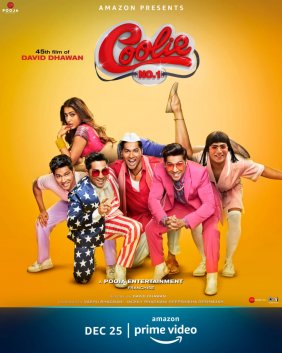
Coolie No. 1 is a 2020 Indian Hindi-language comedy masala film directed by David Dhawan and produced by Vashu Bhagnani. A reboot of the 1995 film of the same name, which itself is a remake of the Tamil film Chinna Mapillai (1993), the film stars Varun Dhawan, Sara Ali Khan, and Paresh Rawal. When a matchmaker is insulted by Jeffrey Rozario, a rich businessman, he vows to exact revenge. As a result, he makes a porter pretend to be a rich man and marries him off to Rozario's daughter.
